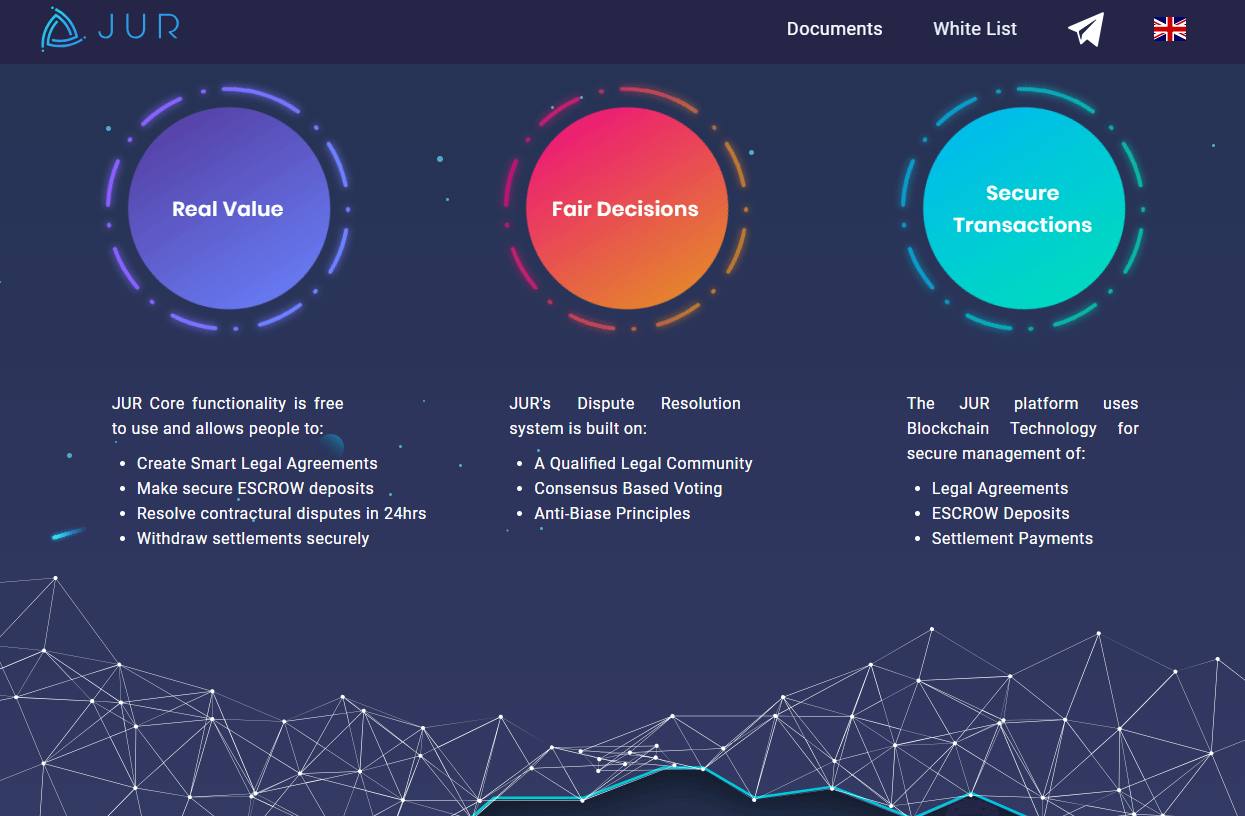Blockchain newcomer JUR has developed a platform to bring better dispute resolution to local and global business transactions through smart contracts. Their blockchain based smart contract solution addresses problems within the existing legal dispute resolution system.
Smart contracts were conceptualized several years before the first blockchain was ever even built. They were designed as a permanent, transparent, and irreversible way to execute an agreement or contract – without the participation of a trusted third party.
Smart contract creator and decentralization pioneer Nick Szabo has described one of the purposes of smart contracts as minimizing the need for trusted intermediaries. In fact, he has also suggested that no third party is reliable.
Speaking at the Synchronize 2018 in New York City, Szabo stated “The traditional banking model is ‘we trust us, why don’t you trust us?'” His original and continuing premise behind smart contracts was to use the immutable database within blockchain technology to manage legal contracts on all levels.

Problem: The Legal-Economic System is Broken
Anyone who has been involved in either side of a civil dispute can attest to the fact that the process is inefficient, slow, and costly. Agreements are made via paper, but economic activity can literally be halted by a breach of contract, perceived or legitimate.
Between legal arbitration and court cases, an enormous market exists to provide dispute resolution services. The longer a case drags on, from mediation to arbitration, to litigation, the more money trusted third party intermediaries make. In the event of a small contract dispute, the existing system isn’t even set up to economically address problems and come to resolution.
Solution: JUR Dispute Resolution
JUR’s dispute resolution mechanism offers a platform for both small scale and large, complex transactions. This is a service that is essential for businesses within an economy to operate successfully. JUR provides several critical structural advantages that are simply unavailable in the same efficient way outside a blockchain.
- Agreement notarization – currently a small, but critical aspect of legal agreements, notarization is completely separate from all other pieces of the transaction. JUR offers notarization services within their platform.
- Contract money escrow capabilities – because smart contracts are permanently tied to the same blockchain that manages token payment services, the entire escrow process – complicated in traditional settings – is simple and affordable, even for small contracts.
- Financial transactions are simply and automatically completed within the blockchain when a contract ends or a dispute is resolved within the JUR system.
- An arbitration system with different groups of voting parties to provide fair results in a decentralized format (i.e. it is not possible to falsify or unjustly sway the decision-making process) using game theory economic incentives, specifically

That last piece, the arbitration, is what really sets JUR apart. It is complex and robust, providing multiple structural options for voting bodies.
In a standard JUR smart contract, the contract is both fulfilled, and disputes are resolved through a predictable and simple set of steps. It starts with setting up the contract. An agreement between two parties is written and agreed upon by both parties. Then money in the form of JUR tokens is placed in an escrow account. If the contract is completed amicably, JUR tokens leave the escrow account and are moved directly to whichever party is getting paid.
If there is a dispute, or if the contract is not fulfilled according to both party’s expectations, the contract goes to a vote by anonymous JUR token holders. These token holders have multiple voting options. They can vote in favor of one party, they can abstain from voting, or they can vote to “Reject” when faced with the option to vote on a contract that they feel is illegal, unethical, or otherwise unvotable.
This is where JUR brings Game Theory into play. People who choose to vote, called “Oracles” within the JUR system, are incentivized with payment via JUR tokens taken from “losing” voters when their vote is in the majority of a dispute. The Game Theory component gives voters a strong incentive to vote in favor of justice because the only payment compensations that ever take place between voters are unjust voters forfeiting their tokens to just voters.
For more complex contracts which may require a specific expert skill set or knowledge base to fairly vote on an outcome, participants may opt to use a special Oracle group, consisting of voters who possess the knowledge and skills necessary to make a just decision. These professional experts include lawyers, medical professionals, real estate agents, and other subject matter expert specialists.
These options were designed to serve and solve a broad range of arbitration and dispute resolution needs. In other words, JUR is targeting their services to almost any individual contractor or business who might otherwise utilize the traditional legal system. Not only that, they are offering services to the previously underserved small contract community, wherein contract dispute resolution services were unavailable before JUR.
In Conclusion
With the current proliferation of blockchain-based business opportunities (the market is projected to reach over $5 billion USD in 2018) and the immense amount of support such a market requires, there is definitely a need for arbitrations within the industry.
However, JUR envisions a system that will benefit multiple markets, including fiat investments, real estate, intellectual property, and web-based business services.



